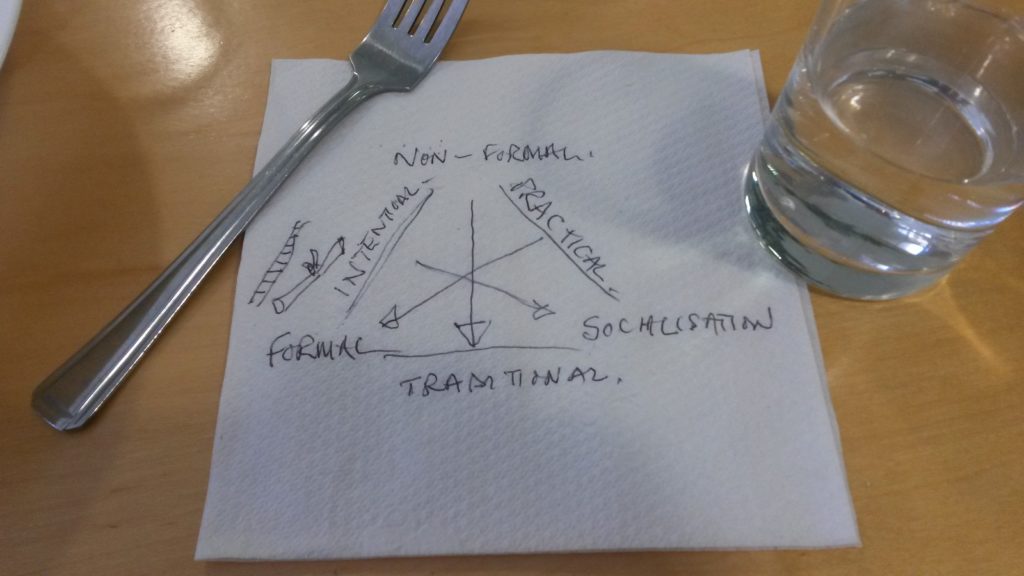The way we understand discipleship gets to the heart of what it means to be Church. Bob Hopkins, of the UK Fresh Expressions team suggests “If church becomes more of a verb, then we can see church done in its different aspects in different activities, engagements, families and get-togethers. . . contributing to one another to make it fully church.”
Three Models of Learning
These different aspects speak to the types of learning needed to promote the disciple making process, especially in regards to a diversity of backgrounds, experiences with or without church, and contexts. He, along with leaders in the field of education, suggest the necessity of understanding three models of learning.
- Formal Learning: This is what we might call classroom learning with chairs in rows facing the teacher. It is what most churched people think of when they hear “Christian discipleship”—or even church for that matter. When we walk into most church services and Christian education classes, we see rows of people facing forward. This is the reason much of our discipleship training has historically been called Sunday School, Church School or in the summer months, Vacation Bible School. While learning of this type often imparts good information about Christian discipleship, comprehension of what has been learned requires non-formal learning as well. Whether we know it or not, non-formal learning models are more often the entry points for discipleship in fresh expressions and a good many other models of church. These models include socialization and apprenticeship.
- Socialization: Joy French, a pioneer ordinand in the Church of England and the leader of a Messy Church in Sheffield credits socialization as the way many “catch” the story of faith. While we may learn the vocabulary and rules of grammar from a book, language fluency happens once we are immersed inside the language and cultural setting. In the same way, discipleship can also be learned through being immersed in Christian life with others. Total immersion is the way we learn to speak to and relate with one another and discover how discipleship looks. This goes beyond retaining information towards formation.
- Apprenticeship: An apprentice becomes an expert in a particular skill or way of life by working alongside an expert. It’s hands-on learning, showing, and modelling that occurs during waking hours. It’s the way Jesus taught his disciples. They would walk alongside him as he healed and ministered and then he would send them out to do the same. It was messy, the debriefing time following the sending out was often frustrating for Jesus, but it was successful enough for Jesus to leave his followers with some very clear instructions to make other disciples.
Discipleship in fresh expressions of church happens non-formally at first. A similar process happens for children in the inherited church. People with very little knowledge of the faith are invited into a social setting where a way of life is modelled and stories are shared. Participants also do something hands-on together.
Family Discipleship in Messy Church
In each meeting of Joy French’s Messy Church, parents and their children are invited to make a meal together. The Messy Church team leads a theme and a craft. Parents who are shy about Bible knowledge and unfamiliar with church learn through the eyes of their children.
Through Messy Church, Each participant is immersed into a new language and culture, as well as relationships. Parents get to know other parents. Children get to know other children. Through activities, stories and even short talks on parenting skills, genuine relationships are strengthened. The children work alongside others to make two or three of the simple craft or project with instructions to share one with a friend. When they share the craft, the friend and the friend’s parents usually come along on the next meeting of Messy Church. This simple process promotes the life of Christian discipleship through non-formal learning leaves the participants hungry for more.
While non-formal discipleship may be different than the formal learning style many of us are used to in our churches, it proves to be an integral method of learning for those involved with fresh expressions of church. What is your experience with non-formal learning? How have you witnessed socialization and/or apprenticeship develop disciples of Jesus?
Join a Pioneer Learning Community and learn how to start a fresh expression of Church


